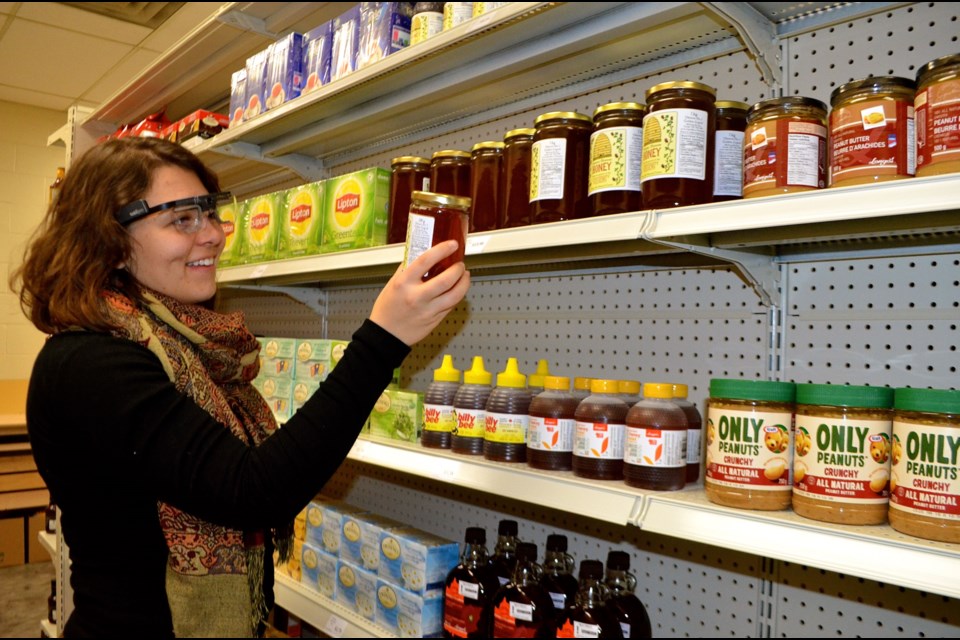Learning about people’s shopping choices is just one of the benefits for student researcher Laura Stortz working on her thesis in the grocery store lab at the University of Guelph.
“I really do like meeting people,” said Stortz. “Research can be very solitary, so I really like that I get to meet a lot of different people. Everyone who has come has been so wonderful and it is great to get to know people in the wider community.”
The Grocery Shopping Study is recruiting 200 to 350 people from Guelph between the ages of 18 and 65 to go shopping in a simulated grocery store on the U of G campus.
“It is really important because studies don’t often include a wide variety of people in the community,” said Stortz. “So, that was a personal goal of my thesis to have as representative a sample as possible. I think that is really important when you are doing research.”
The study is funded by the Ministry of Food, Agriculture and Rural Affairs and use of the lab has been donated by the Longo Brothers Food Markets which is renting it from the Gordon S. Lang School of Business and Economics.
“Here we do various types of research,” Dr. Kimberly Thomas-Francois. “They are mostly consumer behaviour. So, grocery retailing, food service, technology, community health and wellness in a reality-based setting.”
The Grocery Shopping Study began in early November and operates seven days a week by appointment until Dec 19.
“The lab has been around for about two and a half years and provides an opportunity to look at a variety of different things with respect to how people are making food choices in a grocery store context,” said professor Michael Von Massow from the Department of Food, Agricultural and Resource Economics FARE at the U of G.
“Often researchers have used surveys, which are a valid approach and have a lot of merit but sometimes people behave a little differently when they are actually doing the shopping.”
They have attempted to reproduce the look and feel of a real grocery store for the study.
“We’re not fooling anybody,” said Von Massow. “We are on the third floor of a university building. They are not walking into an actual grocery store, but this creates a somewhat more natural setting to evaluate how people process the information and make the decisions and there are a variety of different types of studies we’ve done.”
Participants receive $20 for doing the two-part study that takes between 30 and 40 minutes.
“That includes the grocery shopping and the survey and they go home with a food item” said Stortz. “We randomly select one of the items from their cart. We remind people to pick the things they like because they might go home with it. We also require fluency in English because there is a survey portion at the end.”
The free item has an influence on the study participants.
“Because they don’t know what item will be randomly selected from their basket it makes them take this as real like they are actually going to be purchasing all the items,” said professor Yu Na Lee. “That is something that is more interesting about our study.”
Video cameras are positioned at the end of each aisle and participants wear a pair of specially engineered glasses while they are shopping.
“The glasses have a video camera and they have sensors that track your eye,” said Von Massow. “So, you get a video of what they are looking at and these things track your eye so, we can see on the video specifically what you focus on, the sequence from which you focus on and how long you focus on it. So, we can tell explicitly what and how you are processing the information.”
The information is collected and analyzed by researchers.
“These are hooked up to that unit that records the video and then you can study it afterwards to measure fixation time, sequence of fixation and all sorts of things like that,” said Von Massow. “If they pick something up, we can see if they are looking at the nutritional information or what things they focus on. It provides much greater insight into the decision-making process.
Participants typically enjoy the experience.
“We have a lot of couples who come and use the money to go to the movies afterward or go on a little date,” said Stortz. “If you take the bus we will pay for your bus fare. We try to make it as accessible as possible for everyone in the community.”
They are still looking for people to take part in the study so if you are interested or know someone who might be interested call 519-831-6091 or 519-721-7015 or email [email protected].
“Everyone eats so we are encouraging anyone that is interested to contact us,” said Stortz. “I am often here from eight in the morning until eight at night seven days a week. So, whenever people want to come I will be here. I’ve been telling people on the street that, ‘I need you to come so I can graduate. I will be here whenever you want to come.”

